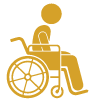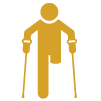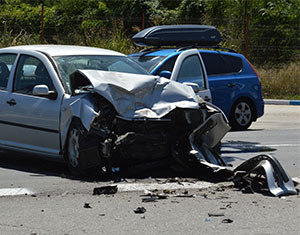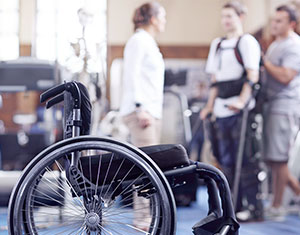Atlanta Catastrophic Injury Attorney for Severe Injury Victims
Because of the extreme impact of catastrophic injury cases on a person’s life, these are not the sort of legal matters that can be approached haphazardly without the aid of experienced legal counsel.
Defendants and insurance companies have a much greater vested interest in fighting these high-value claims than typical injury claims. Often, the amount of damages (how much will be paid) is as fiercely contested — if not more — as the question of liability itself (the legal responsibility to pay).
It is important that victims work with a legal firm that understands how to engage in successful negotiations with defendant corporations, property owners, and insurers, and what evidence will be needed to prevail at trial, if necessary. The Atlanta catastrophic injury attorneys at Apolinsky and Associates are here to help you by reviewing your case.
What Are Catastrophic Injuries?
A catastrophic injury is one that involves permanent changes in the life of an accident victim, such as physical disability and the ability to earn a living. It happens suddenly and without warning, has long-term ramifications, and leads to a decreased quality of life, chronic pain, the need for long-term or ongoing medical treatment, or even a shortened lifespan. Catastrophic injuries also impact the victim’s family, who may depend on the victim as the breadwinner.
Injuries that resulted from someone else’s negligence, criminal actions, or recklessness may mean you can recover compensation for your injuries. That’s why it’s important to work with an experienced Atlanta catastrophic injury lawyer to ensure that your case is thoroughly investigated, including the possibilities of potential financial recovery.
The Official Code of Georgia (§34-9-200.1) description of these injuries for Workers’ Compensation includes:
- Spinal cord injuries
- Amputation of an arm, leg, hand, or foot, and the loss of use
- Severe brain injuries, or “closed head injuries” that lead to cognitive issues
- Second or third-degree burns over 25 percent of the entire body, or third-degree burns to 5 percent or more of the hands or face
- Total or “industrial” blindness (so that someone is unable to pursue an occupation)
- Other injuries that prevent someone from performing their usual occupation or any other type of occupation
Like any accident that leads to injuries, a plaintiff must prove negligence on the part of the defendant, and that the defendant failed to provide the reasonable care owed. An attorney will gather all relevant evidence, including police reports and photographs, speak with and interview witnesses, and investigate the cause of your accident.
Further Reading: Examples of Negligent Security that Lead to Serious Injury
Proving Negligence & Causation in Catastrophic Injury Cases
The first step after any accident involving the spinal cord is to seek immediate medical attention. Documenting your injury from the earliest stages, from the initial emergency assessment to follow-up care, is crucial to supporting your case.
Regardless of the accident that caused you to suffer a catastrophic injury, proving your case is essential to winning and getting fair compensation. In order to do so, you will need to establish negligence by showing that:
- A duty of care existed, and the defendant owed you a level of responsibility
- The defendant breached the duty of care and responsibility
- That breach directly caused your injuries
- You suffered damages that resulted from the breach of care
Under GA Code § 9-3-33, the statute of limitations holds that injured parties have two years to bring personal injury claims forward. After two years, a court will dismiss your claim. Oftentimes, insurance companies will engage in stalling techniques to avoid paying you anything. It is important to begin working with a Georgia personal injury attorney experienced in dealing with catastrophic injury claims as soon as possible to build your case.
Compensation & Damages Recoverable in Catastrophic Personal Injury Cases
In cases of catastrophic injuries, victims will also incur catastrophic losses, including:
- Medical expenses, current and future
- Property damage
- Loss of income
- Loss of future income
- Pain and suffering, including emotional well-being
In some cases, you may also be able to collect punitive damages. Punitive damages are damages that are awarded to punish someone for their actions that led to your accident through their own negligence. These can include a drunk driver, a landlord or property owner who fails to provide adequate security, or a negligent employer that allows unsafe conditions.
Catastrophic injuries generally include medical-related expenses such as:
- Emergency medical care, including an ambulance for transport to the emergency room following an accident
- Surgery and post-surgery medical care
- Hospital bills, including those from medical providers
- Follow-ups with physicians, specialists, physical therapists, and others
- Treatments, prescriptions, and diagnostics (X-Rays, etc.)
- Rehabilitation, including physical or occupational therapy
- Home health care and in-home assistance
- Adaptive physical devices, such as wheelchairs, ramps, and vehicle modifications
In some cases, an accident victim may be able to undergo retraining for a new career, but not always. Occupational evaluation and retraining may help some who are unable to work in their chosen career. Once they reach a level of recovery, retraining will also take time to complete for re-entry into the workforce. Not everyone is able to begin working again after such an injury.
That is why it’s vital to understand your own future healthcare needs when considering a financial settlement. Without enough, you won’t be able to provide for your own needs as well as your family’s going forward.
Insurance companies do not have your best interests in mind. As a business with a bottom line to protect, they are prepared to either deny your claim outright or give you the least amount of money possible. Many companies find ways to deny your claim outright, engage in stalling, or convince you that your case isn’t worth as much as you think. If you accept an insurance company’s offer, there is no way to go back and get more. You likely won’t have enough to take care of yourself and your family.
This is why we strongly suggest that you work with legal counsel to handle your claim. An experienced Atlanta catastrophic injury lawyer can help you navigate the process by working on your behalf to negotiate with the insurance company. Don’t speak to an insurance adjuster yourself. You may inadvertently say something that jeopardizes your claim. The right lawyer will also prepare your case for court if the insurance company refuses to cooperate.
Further Reading: Filing an Injury Claim for Benefits With Your Healthcare Insurer


















